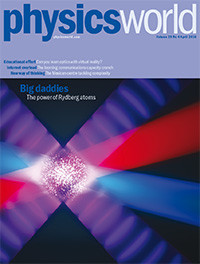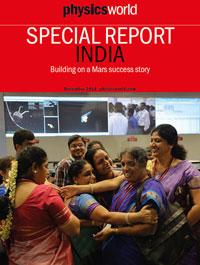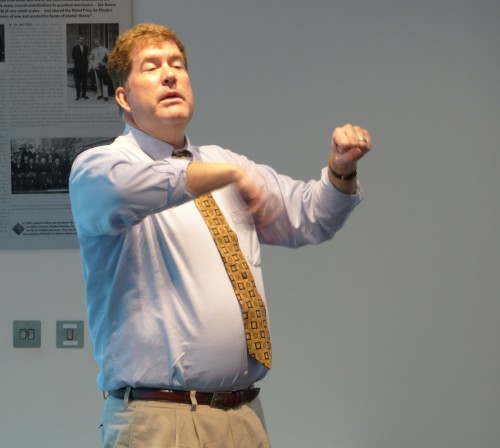Tag archives: education
An animated history of physics, messing around with methane and Vangelis on space
By Hamish Johnston
Topping this week’s Red Folder is an “Animated history of physics” narrated by the Irish comedian and science enthusiast Dara O Briain. Running from Galileo to Einstein’s general theory of relatively – and giving very short shrift to quantum mechanics – it’s more of a selected history. You can enjoy the animations and O Briain’s soothing brogue in the video above.
O Briain often teams up with the particle physicist and media celebrity Brian Cox, who is also in the news recently for teaching children in London how to ignite potentially explosive gas. Before you call social services, it was all in the name of science education and part of Cox’s visit to St. Paul’s Way Trust School. Cox had been invited to the school’s summer science school and obliged by leading an experiment into the properties of methane. “There is no shortage of enthusiasm for students and young people when you talk about science and engineering,” Cox told the Reuters news agency.
Skateboard videos reveal the physics of doing an ‘ollie’

Free-body problem: how do skateboarders do an “ollie”? (Courtesy: Paulo Simeão Carvalho/Physics Education)
By Hamish Johnston
Here’s a problem for keen students of classical mechanics: how can a skateboarder cause their board to leap into the air by pressing down on it with their feet?
What I’ve described is a trick called the “ollie”, which first emerged on the skateboarding scene in the late 1970s and is now an essential part of the skating repertoire. There’s a fascinating paper in the journal Physics Education, which shows how digital videos of people doing an ollie can be analysed to get to grips with the physics underlying the trick.
The above image shows six video frames of someone executing an ollie – with time moving from right to left over a period of about 2 s. If you delve into the paper, you will find out how its authors – Marco Adriano Dias, Paulo Simeão Carvalho and Deise Miranda Vianna – used video images to track the motion of the tail of the board as well as its front and back wheels. This was then compared to a free-body diagram analysis of the forces of the board.
View all posts by this author | View this author's profile
The April 2016 issue of Physics World is now live
 By Matin Durrani
By Matin Durrani
The April 2016 issue of Physics World magazine is ready and waiting for you to access via our app for mobile and desktop.
Our cover story this month is about Rydberg atoms – those super-sized atoms that are one of the hot topics in condensed-matter physics – and in particular how they could be used to create quantum computers.
You can also find out how virtual-reality tools could help you to learn about the science of optics and learn more about a new research centre at the National Autonomous University of Mexico that’s bringing a fresh approach to the science of complexity.
If you’re a member of the Institute of Physics (IOP), you can now enjoy immediate access to the new issue with the digital edition of the magazine in your web browser or on any iOS or Android mobile device (just download the Physics World app from the App Store or Google Play). If you’re not yet in the IOP, you can join as an IOPimember for just £15, €20 or $25 a year to get full access to Physics World digital.
Success, failure and women in physics
By Margaret Harris
Giving out science careers advice is tricky. On the one hand, you want to be encouraging – not least because if you aren’t, there is a chance that your advisee will go on to win a Nobel prize, and you will then look extremely silly. But on the other hand, you also want to prepare the person, mentally, for the possibility of failure. Otherwise, when they do fall short, they may not know how to recover and try again.
The need for balance between encouraging big dreams and preparing for failure was one of the central insights to come out of Sunday’s panel on “Feminism, sexism and bringing up girls” at the Cheltenham Science Festival. After one of the panel members, psychologist Tanya Byron, noted that in clinical practice she sees many bright, successful girls whose fear of failure is “absolutely destroying them”, her fellow panellist Gabriel Weston put her finger on the heart of the problem. How, Weston asked, do we celebrate young women’s achievements and encourage their dreams without also pushing them to be “perfect little glass statues” who shatter under pressure?
View all posts by this author | View this author's profile
Physics World Special Report: India
By Michael Banks

This year has been one of change for India. In May, some 800 million eligible voters went to the polls in an election that was won by the Bhartiya Janata Party. Led by Narendra Modi, the party went on to form a coalition government called the National Democratic Alliance.
Our Special Report, which you can read free online, kicks off by looking at how science is faring under Modi’s fledgling administration. Indeed, in September, Modi was personally on hand at the Indian Space Research Organisation (ISRO) to laud engineers who had just carefully manoeuvred the Mars Orbiter Mission into position around the red planet – a feat that announced India as a major player in space exploration.
Modi’s personal interest in ISRO will not only please the organization’s chairman K Radhakrishnan, who we interview for the report, but could also be seen as a sign that the new administration is serious about boosting science in the country.
View all posts by this author | View this author's profile
Once upon a time…the art of telling a good quantum tale
By Tushna Commissariat
It’s been nearly two weeks since I spent three intense and interesting days in Sweden bundled into a classroom with other journalists and scientists to polish up our knowledge of all things quantum. Since attending the NORDITA science-writing workshop, I have spent a lot of time thinking about one of the main themes of the meeting: “What is the best way to communicate quantum physics to the public?”
Discovering your inner scientist

Chad Orzel in action.
By Matin Durrani
Chad Orzel writes one of the most active and longest running science blogs on the net, having posted the first entry on his blog Uncertain Principles back in June 2002. A physicist at Union College in Schenectady, New York, he’s also written two popular-science books, based on the cute premise of trying to teaching first quantum physics and then relativity to his dog.
So, a couple of months back, when we noticed that Orzel was coming to the UK, we decided to invite him to give a talk as part of the Bristol Festival of Ideas. Orzel kindly accepted our offer and last night saw him speak here at the offices of IOP Publishing, which publishes Physics World. The talk was entitled Eureka! Discovering Your Inner Scientist, which just happens to be the title of Chad’s next book. (And what’s wrong with a spot of self-publicity?)
View all posts by this author | View this author's profile
Choosing physics, or not
By Margaret Harris
I’ve been mulling over this topic for a while, but a pair of blog posts this week has finally prompted me to write about it. One of them, entitled “Why I won’t be studying physics at A-level” appeared yesterday in the education section of the Guardian newspaper. In it, the anonymous female author lists a number of reasons why she is leaving physics, including a lack of female teachers and an “uninspiring” GCSE physics syllabus that “seemed out of touch compared with the stem cells and glucoregulation we were studying in biology”. There’s plenty to debate there already, but to me, the following paragraph was the most striking:
“I don’t dislike physics; neither do I find it boring or particularly difficult. But I do enjoy my other subjects more, so when it came to choosing between physics and geography for my fourth AS-level I opted for the latter. I thought it would be good to take a humanities subject to balance out the sciences.”
Why axing practicals from science exams is a bad idea

(iStock/LuVo)
By Matin Durrani
I don’t know about you, but I look back rather nostalgically on the practical exams that I took as an 18 year old as part of my A-levels in physics and chemistry. At the time, I wasn’t looking forward to them at all – they lasted three hours each and there was always the very large possibility of completely mucking up your experiment and/or dropping all your samples on the floor.
Although I’ve forgotten everything about my physics practical exam, the chemistry practical still sticks out in my mind. I remember making some needle-like crystals that, through amazing good fortune, turned out really well – certainly far better than the watery mush I’d created in my mock exams. So when I walked over to the other side of the lab to measure the temperature at which the crystals melted, they did so over a really narrow range – and presumably at the “correct” temperature too.
View all posts by this author | View this author's profile
Student behaviour in the MOOCosphere

Does student behaviour online mirror the traditional classroom? (Courtesy: Shutterstock/wavebreakmedia)
By James Dacey
I’ve written a few times recently about the rise of massive open online courses, or “MOOCs” for short. If this trend in education has so far passed you by, MOOCs are online courses generally offered free of charge by some of the leading universities in the world. For example, Massachusetts Institute of Technology offers courses in classical mechanics and electricity & magnetism, and the University of Edinburgh has recently launched a course about the discovery of the Higgs boson.
MOOCs tend to combine video lectures with assignments such as problem sets and extended projects. In many ways, the course formats mirror or complement traditional classroom-based education, incorporating features such as forums where students can discuss the course content amongst themselves. Some of the science courses even include online “practicals” by way of virtual laboratories. But despite the proliferation of MOOCs in the past few years, very little research has been carried out on the way that students are actually engaging with the courses.
Now, a group of researchers in the US has done the first relatively detailed study of student behaviour in the MOOCosphere. The study is described in a paper published on the arXiv preprint server with lead author Ashton Anderson, a computer scientist at Stanford University. Anderson and his team examined the behaviour of the student population in courses offered by Stanford through Coursera, one of the major MOOC providers. The courses were on the topics of machine learning and probabilistic graphical models. After reading the study, it seems to me that the “take away” message is that MOOC students have many different motivations for taking these courses and as a result they behave in an assortment of ways, distinct from classrooms in the real world.
View all posts by this author | View this author's profile
